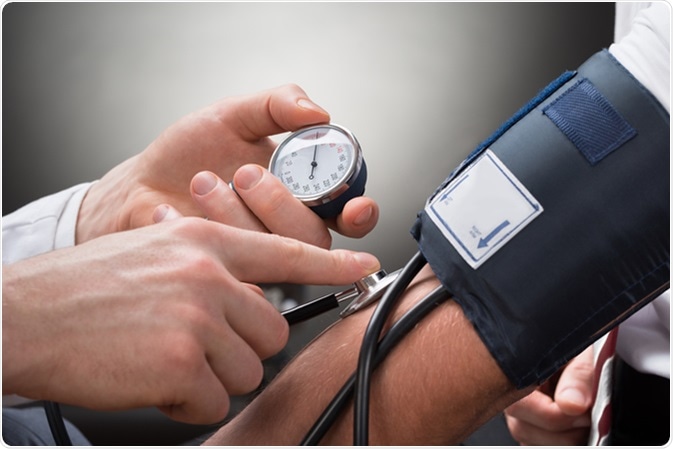Orthostatic hypotension is low blood pressure that is experienced when rapidly standing up from a sitting or lying position.

Image Credit: Andrey Popov / Shutterstock
What is orthostatic hypotension?
Orthostatic hypotension, also known as postural hypotension, happens when blood vessels in the body fail to constrict (narrow) in response to gravity. This causes a decrease in blood pressure and reduced blood supply to the brain, leading to lightheadedness and fainting.
Clinically, a fall of 20 mm Hg or more in systolic blood pressure and 10 mm Hg or more in diastolic blood pressure after standing is defined as orthostatic hypotension.
Acute or infrequent orthostatic hypotension is generally mild and can be treated easily; however, chronic occurrence likely indicates an underlying disorder.
What are the symptoms of orthostatic hypotension?
The most common symptom is feeling lightheaded, which usually resolves within a few minutes. However, in severe cases, fainting can occur. Other signs and symptoms of orthostatic hypotension include
- Blurry vision
- Weakness
- Fatigue
- Neck, shoulder, or chest pain
- Nausea
- Confusion
- Muscle tremor
- Orthostatic dyspnea
Why Do I Get Dizzy When I Stand Up? Understanding Orthostatic Hypotension (OH) | TIME
What causes orthostatic hypotension?
When a person is sitting or lying, more blood is pooled in blood vessels of the legs. Upon standing, there is a systemic blood in blood pressure when less blood is circulating back to the heart.
Normally, special sensors (baroreceptors) present in the aorta and two carotid arteries detect this drop and maintain the blood pressure by increasing heart rate and constricting (narrowing) abdominal and leg blood vessels. Orthostatic hypotension occurs when this normal physiologic process fails to maintain blood pressure properly.
Factors responsible for developing orthostatic hypotension include:
Dehydration – dehydration due to lack of fluid ingestion, fever, vomiting, diarrhea, or excessive sweating reduces blood volume and increases the risk of orthostatic hypotension.
Cardiac problems – certain cardiac problems, such as low heart rate or bradycardia, structural or functional impairment of heart valves, or heart failure reduce the body’s ability to maintain blood pressure when standing up.
Endocrine problems – thyroid-related problems, adrenal insufficiency, and low or high blood glucose level can significantly disrupt blood pressure regulation by damaging neuronal transmission.
Neurodegenerative disorders – some underlying nervous system disorders, such as Parkinson's disease, multiple system atrophy, Lewy body dementia, and amyloidosis, increase the risk of developing orthostatic hypotension.
Aging – the risk of orthostatic hypotension increases with age and fragility and is associated with prolonged standing and other chronic medical conditions. A drop in blood pressure due to elevated intestinal blood circulation during food digestion can occur as well. This condition, also known as post-prandial hypotension, occurs around 15 – 45 minutes after having meal, and can lead to this condition.
Medication – medicines used for the treatment of high blood pressure (beta blockers, calcium channel blockers, angiotensin-converting enzyme inhibitors, nitrates, and angiotensin II blockers) and anxiety, depression, erectile dysfunction, and those used to increase urination (such as diuretics) may also cause orthostatic hypotension.
Prolonged bed rest – attenuation of the vestibulo-sympathetic reflex (regulation of blood pressure by the vestibular system during movement and postural changes) due to prolonged bed rest is associated with the development of orthostatic hypotension
Pregnancy – the possibility of a drop in blood pressure during pregnancy is related to the rapid expansion of the circulatory system.
Excessive alcohol consumption – too much alcohol consumption can cause dehydration, and thus, is associated with orthostatic hypotension.
Exposure to hot environment – dehydration due to extreme heat can cause orthostatic hypotension.
Certain health conditions, such as anemia and spinal cord disorders (syringomyelia) can increase the risk of orthostatic hypotension. Factors that are associated with orthostatic hypotension in spinal cord disorders include alteration in sympathetic activity, impaired baroreflex, and salt/water imbalance.
Further Reading
Last Updated: Jan 21, 2019